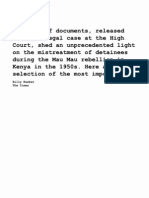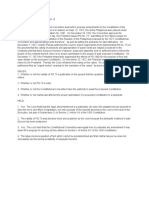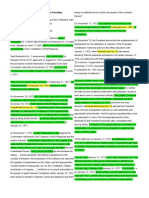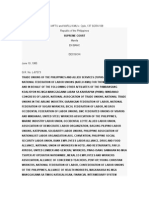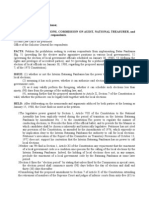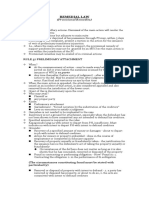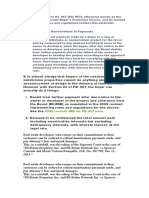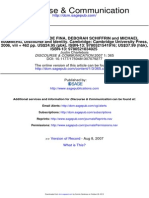100%(1)100% found this document useful (1 vote)
652 viewsCharito Planas Vs Comelec
Charito Planas Vs Comelec
Uploaded by
Dianne ComonCharito Planas filed a case challenging the validity of Presidential Decree No. 73, which set a plebiscite for January 15, 1973 to ratify or reject the constitution proposed by the 1971 constitutional convention. Meanwhile, martial law was in place and the plebiscite was postponed. On January 15, 1973, a proclamation was issued announcing the ratification of the proposed constitution by an overwhelming majority. The court dismissed the case as the issue was now moot and academic, with six justices finding the issue moot and two upholding the validity of the decree.
Copyright:
© All Rights Reserved
Available Formats
Download as DOC, PDF, TXT or read online from Scribd
Charito Planas Vs Comelec
Charito Planas Vs Comelec
Uploaded by
Dianne Comon100%(1)100% found this document useful (1 vote)
652 views2 pagesCharito Planas filed a case challenging the validity of Presidential Decree No. 73, which set a plebiscite for January 15, 1973 to ratify or reject the constitution proposed by the 1971 constitutional convention. Meanwhile, martial law was in place and the plebiscite was postponed. On January 15, 1973, a proclamation was issued announcing the ratification of the proposed constitution by an overwhelming majority. The court dismissed the case as the issue was now moot and academic, with six justices finding the issue moot and two upholding the validity of the decree.
Original Description:
Planas vs Comelec
Original Title
Charito Planas vs Comelec
Copyright
© © All Rights Reserved
Available Formats
DOC, PDF, TXT or read online from Scribd
Share this document
Did you find this document useful?
Is this content inappropriate?
Charito Planas filed a case challenging the validity of Presidential Decree No. 73, which set a plebiscite for January 15, 1973 to ratify or reject the constitution proposed by the 1971 constitutional convention. Meanwhile, martial law was in place and the plebiscite was postponed. On January 15, 1973, a proclamation was issued announcing the ratification of the proposed constitution by an overwhelming majority. The court dismissed the case as the issue was now moot and academic, with six justices finding the issue moot and two upholding the validity of the decree.
Copyright:
© All Rights Reserved
Available Formats
Download as DOC, PDF, TXT or read online from Scribd
Download as doc, pdf, or txt
100%(1)100% found this document useful (1 vote)
652 views2 pagesCharito Planas Vs Comelec
Charito Planas Vs Comelec
Uploaded by
Dianne ComonCharito Planas filed a case challenging the validity of Presidential Decree No. 73, which set a plebiscite for January 15, 1973 to ratify or reject the constitution proposed by the 1971 constitutional convention. Meanwhile, martial law was in place and the plebiscite was postponed. On January 15, 1973, a proclamation was issued announcing the ratification of the proposed constitution by an overwhelming majority. The court dismissed the case as the issue was now moot and academic, with six justices finding the issue moot and two upholding the validity of the decree.
Copyright:
© All Rights Reserved
Available Formats
Download as DOC, PDF, TXT or read online from Scribd
Download as doc, pdf, or txt
You are on page 1of 2
G.R. No.
L-35925 January 22, 1973
CHARITO PLANAS, petitioner,
vs.
COMMISSION ON ELECTIONS, et al., respondents.
FACTS:
On March 16, 1967, Congress of the Philippines passed Resolution calling a Convention to
propose amendments to the Constitution of the Philippines. Said Resolution was
approved on August 24, 1970, pursuant to the provisions of which the election of
delegates to said Convention was held on November 10, 1970, and the 1971
Constitutional Convention began to perform its functions on June 1, 1971. While the
Convention was in session on September 21, 1972, the President issued Proclamation No.
1081 placing the entire Philippines under Martial Law. On November 29, 1972, the
Convention approved its Proposed Constitution of the Republic of the Philippines. The
next day, November 30, 1972, the President of the Philippines issued Presidential Decree
No. 73, "submitting to the Filipino people for ratification or rejection the Constitution of
the Republic of the Philippines proposed by the 1971 Constitutional Convention, and
appropriating funds therefor," as well as setting the plebiscite for said ratification or
rejection of the Proposed Constitution on January 15, 1973.
Soon after, or on December 7, 1972, Charito Planas filed a case against the Commission
on Elections, the Treasurer of the Philippines and the Auditor General for the
implementation of the respondents or their agents of Presidential Decree No. 73, and
further states that the said Decree "has no force and effect as law because the calling ...
of such plebiscite, the setting of guidelines for the conduct of the same, the prescription
of the ballots to be used and the question to be answered by the voters, and the
appropriation of public funds for the purpose, are, by the Constitution, lodged exclusively
in Congress.
Meanwhile, or on December 17, 1972, the President had issued an order temporarily
suspending the effects of Proclamation No. 1081, for the purpose of free and open debate
on the Proposed Constitution. On December 23, the President announced the
postponement of the plebiscite for the ratification or rejection of the Proposed
Constitution. No formal action to this effect was taken until January 7, 1973, when
General Order No. 20 was issued, directing "that the plebiscite scheduled to be held on
January 15, 1973, be postponed until further notice." Said General Order No. 20,
moreover, "suspended in the meantime" the "order of December 17, 1972, temporarily
suspending the effects of Proclamation No. 1081 for purposes of free and open debate on
the proposed Constitution."
On January 15, 1973, the President issued a proclamation entitled PROCLAMATION
NO. 1102, ANNOUNCING THE RATIFICATION BY THE FILIPINO PEOPLE OF THE
CONSTITUTION PROPOSED BY THE 1971 CONSTITUTIONAL CONVENTION which states
that the Constitution proposed by the nineteen hundred and seventy-one (1971)
Constitutional Convention has been ratified by an overwhelming majority of all the votes
cast by the members of all the Barangays (Citizens Assemblies) throughout the
Philippines, and has thereby come into effect.
ISSUE:
The validity of Presidential Decree No. 73.
HELD:
The court dismissed the case, without special pronouncement as to costs. On validity of
the decree, six (6) Members of the Court, are of the opinion that the issue has become
moot and academic, whereas two (2) Members voted to uphold the validity of said
Decree.
You might also like
- Kenya DocumentsDocument43 pagesKenya Documentsmike_hills6221No ratings yet
- Planas Vs COMELEC (Digest)Document10 pagesPlanas Vs COMELEC (Digest)caramelsundaeNo ratings yet
- Planas Vs Comelec Case DigestDocument8 pagesPlanas Vs Comelec Case DigestJet jet NuevaNo ratings yet
- Ielts Authorization FormDocument1 pageIelts Authorization FormDiệu Linh NguyễnNo ratings yet
- Javellana vs. The Executive Secretary (Digest)Document5 pagesJavellana vs. The Executive Secretary (Digest)Jessa F. Austria-CalderonNo ratings yet
- Digest Planas Vs ComelecDocument4 pagesDigest Planas Vs ComelecAtty Ed Gibson BelarminoNo ratings yet
- Defensor-Santiago v. COMELECDocument2 pagesDefensor-Santiago v. COMELECKev Nambs50% (2)
- Consti Digested Case - Francisco vs. House of RepresentativesDocument2 pagesConsti Digested Case - Francisco vs. House of RepresentativesErnest Godfrey Tejada100% (3)
- Case Digest For Sanidad Vs COMELECDocument2 pagesCase Digest For Sanidad Vs COMELECDivineDionne100% (5)
- De Leon Vs EsguerraDocument1 pageDe Leon Vs Esguerratpagusara100% (1)
- 12 - in Re - Saturnino BermudezDocument1 page12 - in Re - Saturnino BermudezRosemarie DANo ratings yet
- Supreme Court: Initio On The Ground of Psychological Incapacity On The Part of Both Petitioner and Respondent UnderDocument40 pagesSupreme Court: Initio On The Ground of Psychological Incapacity On The Part of Both Petitioner and Respondent UnderRagna Rok11No ratings yet
- Kilosbayan vs. MoratoDocument2 pagesKilosbayan vs. MoratoCeledonio ManubagNo ratings yet
- Sequencing HISTORYDocument4 pagesSequencing HISTORYAlec Mackadelic71% (7)
- People v. Perfecto, G.R. No. L-18463, October 4, 1922 People Vs Linsangan DigestDocument41 pagesPeople v. Perfecto, G.R. No. L-18463, October 4, 1922 People Vs Linsangan Digestlois DasmariñasNo ratings yet
- Javellana VS Executive SecretaryDocument5 pagesJavellana VS Executive SecretaryMA. TERESA DADIVASNo ratings yet
- Planas Vs ComelecDocument1 pagePlanas Vs ComelecDever GeronaNo ratings yet
- Javellana vs. Executive Secretary - DIGESTDocument5 pagesJavellana vs. Executive Secretary - DIGESTKyle Gwapo75% (4)
- Javellana Vs Exec Sec DIGESTDocument5 pagesJavellana Vs Exec Sec DIGESTana_q05100% (1)
- Planas Vs ComelecDocument4 pagesPlanas Vs ComelecAnsis Villalon Pornillos100% (3)
- Planas Vs ComelecDocument1 pagePlanas Vs ComelecEvangelyn Egusquiza100% (2)
- Planas v. ComelecDocument4 pagesPlanas v. Comelecxperiakira100% (1)
- G.R. No. L-44640. October 12, 1976 DigestDocument2 pagesG.R. No. L-44640. October 12, 1976 DigestMaritoni Roxas100% (2)
- Gonzales Vs ComelecDocument15 pagesGonzales Vs Comelecmichael actubNo ratings yet
- Javellana Vs Executive Secretary GR No 36142, March 31, 1973Document47 pagesJavellana Vs Executive Secretary GR No 36142, March 31, 1973PrincessAngelicaMoradoNo ratings yet
- Estrada V ArroyoDocument4 pagesEstrada V ArroyoChil Belgira100% (7)
- Stat ConDocument2 pagesStat ConRodolfo Dagooc Jr.No ratings yet
- Ministerio v. CFI of Cebu 40 SCRA 464Document6 pagesMinisterio v. CFI of Cebu 40 SCRA 464ymaguindra100% (1)
- Caltex v. Palomar GR L-19650 Sept 26 1966 18 SCRA 247Document2 pagesCaltex v. Palomar GR L-19650 Sept 26 1966 18 SCRA 247John Richter100% (5)
- Kilosbayan V Guingona, JR PDFDocument1 pageKilosbayan V Guingona, JR PDFJames Francis VillanuevaNo ratings yet
- Facts - Occeña Vs COMELEC Case DigestDocument4 pagesFacts - Occeña Vs COMELEC Case DigestApril Kate OrendainNo ratings yet
- Digest Co Kim Cham v. ValdezDocument2 pagesDigest Co Kim Cham v. Valdez유니스No ratings yet
- Javellana - Vs - Executive Secretary, 50 Scra 30 (1973)Document5 pagesJavellana - Vs - Executive Secretary, 50 Scra 30 (1973)Anakata100% (3)
- Francisco vs. House of Representatives, G.R. No. 160261, Nov. 10, 2003Document34 pagesFrancisco vs. House of Representatives, G.R. No. 160261, Nov. 10, 2003Inez PadsNo ratings yet
- Tupas Vs OpleDocument10 pagesTupas Vs Oplemcris10150% (2)
- Javellana Vs Executive SecretaryDocument2 pagesJavellana Vs Executive Secretaryemmaniago08100% (2)
- Manila Prince Hotel vs. Gsis Case DigestDocument2 pagesManila Prince Hotel vs. Gsis Case DigestMav Zamora100% (1)
- 20 and 44 Chavez Vs JBCDocument2 pages20 and 44 Chavez Vs JBCAna Altiso100% (2)
- LAMP Vs Sec of DBM (2012)Document2 pagesLAMP Vs Sec of DBM (2012)Julie Ann TolentinoNo ratings yet
- CONSTI Lawyers League Vs AquinoDocument2 pagesCONSTI Lawyers League Vs AquinoPafra BariuanNo ratings yet
- OCCEÑA Vs COMELEC (1980) (GR No. L-52265)Document2 pagesOCCEÑA Vs COMELEC (1980) (GR No. L-52265)Michelle Jahnille Pablo100% (1)
- Echegaray Vs Sec of Justice Case DigestDocument1 pageEchegaray Vs Sec of Justice Case DigestEbbe Dy100% (1)
- Aquino Vs EnrileDocument1 pageAquino Vs EnrileAnnalou Galacio BeatoNo ratings yet
- Javellana v. Executive SecretaryDocument2 pagesJavellana v. Executive SecretaryJuvial Guevarra BostonNo ratings yet
- Demetria V AlbaDocument1 pageDemetria V AlbaAlexandrea CornejoNo ratings yet
- Occena v. Commission, 104 SCRA 1Document5 pagesOccena v. Commission, 104 SCRA 1Ryan ChristianNo ratings yet
- David Et Al Vs Gma Et Al DigestDocument3 pagesDavid Et Al Vs Gma Et Al DigestMarx AndreiOscar Villanueva Yaun100% (1)
- Gudani Vs SengaDocument3 pagesGudani Vs SengaLeslie Octaviano100% (1)
- Digest - Tanada vs. TuveraDocument3 pagesDigest - Tanada vs. TuveraVloudy Mia Serrano PangilinanNo ratings yet
- Ifurong V Carpio-Morales PDFDocument20 pagesIfurong V Carpio-Morales PDFanne6louise6panagaNo ratings yet
- Chavez Vs Judicial and Bar CouncilDocument2 pagesChavez Vs Judicial and Bar CouncilChammy100% (1)
- 1.1 Francisco Vs HOR Case DigestDocument2 pages1.1 Francisco Vs HOR Case DigestHaelSerNo ratings yet
- Go Tek V Deportation BoardDocument1 pageGo Tek V Deportation Boardgelatin528No ratings yet
- 083-Chavez v. JBC G.R. No. 202242 April 16, 2013Document18 pages083-Chavez v. JBC G.R. No. 202242 April 16, 2013Eunice ChavezNo ratings yet
- Herrera V COMELECDocument4 pagesHerrera V COMELECTheodore BallesterosNo ratings yet
- Neri V Senate Committees DigestDocument7 pagesNeri V Senate Committees DigestkoochNo ratings yet
- Case Digests Part 1Document19 pagesCase Digests Part 1dingNo ratings yet
- Javellanaet Al Vs Executive Secretary Main Ponencia Case DigestDocument5 pagesJavellanaet Al Vs Executive Secretary Main Ponencia Case DigestJosh GatusNo ratings yet
- Javellana vs. Executive SecretaryDocument5 pagesJavellana vs. Executive SecretaryJohnny English100% (1)
- Javellana Vs Executive SecretaryDocument6 pagesJavellana Vs Executive SecretaryChino CabreraNo ratings yet
- Javellana vs. The Executive Secretary Case Digest (Consti-1)Document7 pagesJavellana vs. The Executive Secretary Case Digest (Consti-1)Samm LaurenNo ratings yet
- 05 Digested - Planas v. Comelec - 28Jun18JMDocument1 page05 Digested - Planas v. Comelec - 28Jun18JMJoseph II MendozaNo ratings yet
- Javellana Vs Executive Secretary DigestDocument6 pagesJavellana Vs Executive Secretary DigestPierreNo ratings yet
- (DGC) Provrem NotesDocument15 pages(DGC) Provrem NotesDianne ComonNo ratings yet
- QuitclaimDocument2 pagesQuitclaimDianne ComonNo ratings yet
- Office of The City Prosecutor: ComplainantDocument15 pagesOffice of The City Prosecutor: ComplainantDianne ComonNo ratings yet
- Slide 3 - The Service System Design MatrixDocument3 pagesSlide 3 - The Service System Design MatrixDianne ComonNo ratings yet
- Letter of Commitment TemplateDocument1 pageLetter of Commitment TemplateDianne ComonNo ratings yet
- (DGC) Civpro NotesDocument16 pages(DGC) Civpro NotesDianne ComonNo ratings yet
- Research (R25 and R68)Document1 pageResearch (R25 and R68)Dianne ComonNo ratings yet
- Begun and Held in Metro Manila, On Monday, The Twenty-Fifth Day of July, Two Thousand ElevenDocument54 pagesBegun and Held in Metro Manila, On Monday, The Twenty-Fifth Day of July, Two Thousand ElevenDianne ComonNo ratings yet
- 2009 Revised IRR For PD 957 HereDocument2 pages2009 Revised IRR For PD 957 HereDianne ComonNo ratings yet
- Jan2216poea List of Accreited Shipping AgencyDocument69 pagesJan2216poea List of Accreited Shipping AgencyDianne ComonNo ratings yet
- Demand Letter Rental and VacateDocument2 pagesDemand Letter Rental and VacateDianne ComonNo ratings yet
- 8 Ways To Attain A PureDocument3 pages8 Ways To Attain A PureDianne ComonNo ratings yet
- 2 Tax Malupit Digest Jais 3rd MeetingDocument17 pages2 Tax Malupit Digest Jais 3rd MeetingDianne ComonNo ratings yet
- I. Basic Principles and Concepts A. Constitutional Provisions/Basis I. Ii. Labor StandardsDocument2 pagesI. Basic Principles and Concepts A. Constitutional Provisions/Basis I. Ii. Labor StandardsDianne ComonNo ratings yet
- Finals Reviewer DeeDocument10 pagesFinals Reviewer DeeDianne ComonNo ratings yet
- My Top 10 List of Bible Verses About HopeDocument3 pagesMy Top 10 List of Bible Verses About HopeDianne ComonNo ratings yet
- Preliminary Title & Persons & Family Relations OutlineDocument17 pagesPreliminary Title & Persons & Family Relations OutlineDianne ComonNo ratings yet
- Envi 1Document17 pagesEnvi 1Dianne Comon100% (1)
- Justification of The Use of Terror, RobespierreDocument2 pagesJustification of The Use of Terror, RobespierreAbbey BrookerNo ratings yet
- AP PRC 10 Enhancement of E.L. Upto 120 To180 DaysDocument2 pagesAP PRC 10 Enhancement of E.L. Upto 120 To180 DaysSEKHARNo ratings yet
- SEC Vs Interport Resources Corp PDFDocument2 pagesSEC Vs Interport Resources Corp PDFMoairah LaritaNo ratings yet
- Power of Eminent DomainDocument13 pagesPower of Eminent DomainLeslie Ann LaoNo ratings yet
- Delta Traffic Service, Inc., Oneida Motor Freight, Inc. v. Occidental Chemical Corporation, 846 F.2d 911, 3rd Cir. (1988)Document8 pagesDelta Traffic Service, Inc., Oneida Motor Freight, Inc. v. Occidental Chemical Corporation, 846 F.2d 911, 3rd Cir. (1988)Scribd Government DocsNo ratings yet
- Code-Switching or Code-MixingDocument2 pagesCode-Switching or Code-MixingCynthya AHNo ratings yet
- Cpec 2Document29 pagesCpec 2Muhammad SufyanNo ratings yet
- Final DraftDocument3 pagesFinal Draftteardrop078878No ratings yet
- Complete Download (eBook PDF) An American Presidency: Institutional Foundations of Executive Politics PDF All ChaptersDocument51 pagesComplete Download (eBook PDF) An American Presidency: Institutional Foundations of Executive Politics PDF All Chaptersubrajsevic20100% (2)
- Mini-Lesson 2 French Revolution Crises StageDocument4 pagesMini-Lesson 2 French Revolution Crises Stagec. reyesNo ratings yet
- Discourse and IdentityDocument4 pagesDiscourse and IdentityCamila Cárdenas NeiraNo ratings yet
- Complaint Against Candace and David FayDocument2 pagesComplaint Against Candace and David FayDaniel R. Gaita, MA, LMSW100% (1)
- Philippine Agrarian LawDocument20 pagesPhilippine Agrarian LawVictoria Almeria GonzalesNo ratings yet
- Labor Law QuizDocument7 pagesLabor Law QuizChristine Jeunesse UsmanNo ratings yet
- In Re. Federal Bureau of Prisons Execution Protocol Cases Stay ApplicationDocument54 pagesIn Re. Federal Bureau of Prisons Execution Protocol Cases Stay ApplicationWashington Free BeaconNo ratings yet
- Official Communication Between India and China Between 1961-63Document583 pagesOfficial Communication Between India and China Between 1961-63Canary Trap50% (2)
- Bahasa Inggris PtsDocument2 pagesBahasa Inggris PtsZahra SabilaNo ratings yet
- PRESENTATION: HIV and Migrant Workers in The GMS Program and Policy IssuesDocument26 pagesPRESENTATION: HIV and Migrant Workers in The GMS Program and Policy IssuesADB Health Sector GroupNo ratings yet
- Article 6 Marcos - Formative AssessmentDocument5 pagesArticle 6 Marcos - Formative AssessmentAnne Corine Ramos100% (1)
- Persepolis Movie An AnalysisDocument4 pagesPersepolis Movie An AnalysisDannyn ChenNo ratings yet
- Unit Plan - Decolonization IndependenceDocument2 pagesUnit Plan - Decolonization Independenceapi-663087580No ratings yet
- The Beginning of The LieDocument10 pagesThe Beginning of The Liepreston_402003100% (1)
- Casco Vs GimenezDocument2 pagesCasco Vs GimenezMemings EvilshitNo ratings yet
- Crenshaw Demarginalizing Intersection Race SexDocument8 pagesCrenshaw Demarginalizing Intersection Race SexMinBsbNo ratings yet
- THE MEANING AND PURPOSE OF HUMAN SEXUALITY by Samuel B. BataraDocument3 pagesTHE MEANING AND PURPOSE OF HUMAN SEXUALITY by Samuel B. BataraSamu BataNo ratings yet
- Sask. Has Stopped Trying To Control COVID-19. What Does That Mean For Seniors - CBC NewsDocument11 pagesSask. Has Stopped Trying To Control COVID-19. What Does That Mean For Seniors - CBC NewsrmfexecNo ratings yet
- Resident Marine Mammals v. Angelo Reyes, Et - Al. - Case DigestDocument4 pagesResident Marine Mammals v. Angelo Reyes, Et - Al. - Case DigestJJMO80% (5)
